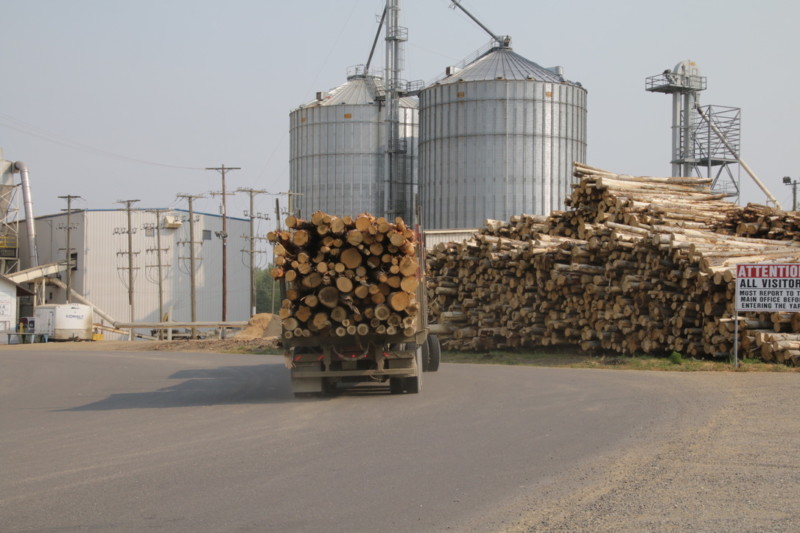
In a Nova Scotia research lab, the last hope for an ancient fish species
Racing against time, dwindling habitat and warming waters, scientists are trying to give this little-known...
By Tegan Hansen, forest campaigner at Stand.earth.
When the United Nations created the International Day of Forests, they did so for good reason: forests are essential to our future, but they continue to be degraded and destroyed at a mind boggling scale.
Canada has a disproportionate role to play in forest protection, because it is home to almost a third of all the world’s forests, including the largest intact forest on Earth — the boreal — and the towering old-growth rainforests in British Columbia, which are among the planet’s most carbon-rich.
But federal and provincial governments in Canada are not taking our role seriously. About a million acres of boreal forest are logged each year, for everything from building material to toilet paper. The long-term impacts of clearcutting have created a carbon debt in Canada, as large tracts of forest are unable to recover.
While old-growth forest continues to be clearcut in B.C., a fundamental lack of adequate monitoring and oversight means that even the government is unlikely to know exactly what is being trucked off the land. Species that signal the broader health of forest ecosystems, like woodland caribou, continue to disappear.
If forests are our future, then the future is fragmented, overrun and on the brink of collapse.
Our communities depend on forests locally and globally: we look to woodland ecosystems for everything from jobs and recreation to clean water and air.
Forests are being used to fuel crises when they can be a key part of the solution to global problems. As toilet paper makes headlines this week, top brands like Charmin continue to source fibre from endangered caribou habitat and carbon-rich forests.
And Canada is making forests a new battleground in the global rush to curb our addiction to coal. Wood pellets are being exported from Canada to countries like the U.K. and Japan, where they’re burned in coal-converted power plants under the guise of renewable energy. But in reality, biomass energy creates more carbon emissions at the stack than coal.

A logging truck enters Pacific BioEnergy’s pellet plant in Prince George. Photo: Dominick DellaSala
We’re heading into an uncertain time. Where I’m sitting, on the banks of the Kootenay River, the region is at a heightened risk of flooding. A large snowpack, changing weather patterns and massive clearcuts in watersheds are contributing to a dangerous situation for communities in B.C.
Elsewhere, extreme flooding is already a reality. Just this week, Indigenous people in the Amazon have lost homes, schools, and other vital infrastructure to severe flooding along the Bobonaza River. Resources to address this disaster in the middle of a pandemic are limited.
Indigenous Nations in the Amazon have been battling forest destruction and climate change, two drivers of these massive floods, for years. Indigenous territories in Ecuador and Peru are being targeted for massive expansion of oil drilling in the Amazon Sacred Headwaters, which is home to 75 million acres of the most biodiverse forest on the planet. If expansion plans move ahead, an area about the size of Texas will be opened to drilling.
From the boreal to the Amazon, the work to defend forests and forest communities is linked. On this International Day of Forests, we’re contending with the disasters that we have been warned about for decades: fires, floods and economic crisis.
Good forest policy can make these problems less severe. Intact, old forests can mitigate floods and fires and protect access to clean water. Well-managed forests can provide access to timber and recreation across generations.
So far, governments in Canada have failed to act in the ecological and long-term interests of forest communities. With old forests on the brink, we only have a handful of years to reverse this trend. The policy choices that we’re making now will resonate for a long time.
In April, the B.C. government will receive a report from an independent old-growth panel, recommending action for the future of our oldest remaining forests. British Columbians will not see these findings for another six months, and concrete action could take even longer. Our forests and communities simply cannot afford that delay.
In their responses to COVID-19, governments and policy-makers have shown the scale of action they are prepared to take to address an emergency. But more importantly, our communities have shown their true value, as neighbours step up to protect each other and ensure our collective wellbeing.
That’s the key lesson that forests share with us: roots don’t grow deep, they spread wide. We need to chart a more hopeful path for forests, one that builds a resilient, community-oriented and abundant future.
Like what you’re reading? Sign up for The Narwhal’s weekly newsletter.
Get the inside scoop on The Narwhal’s environment and climate reporting by signing up for our free newsletter. On March 17, federal Conservative Leader Pierre Poilievre...
Continue reading
Racing against time, dwindling habitat and warming waters, scientists are trying to give this little-known...

From investigative reporting to stunning photography, we’ve been recognized with four 2024 CAJ Awards nods...

The Narwhal is expanding its reach on video platforms like YouTube and TikTok. First up?...
